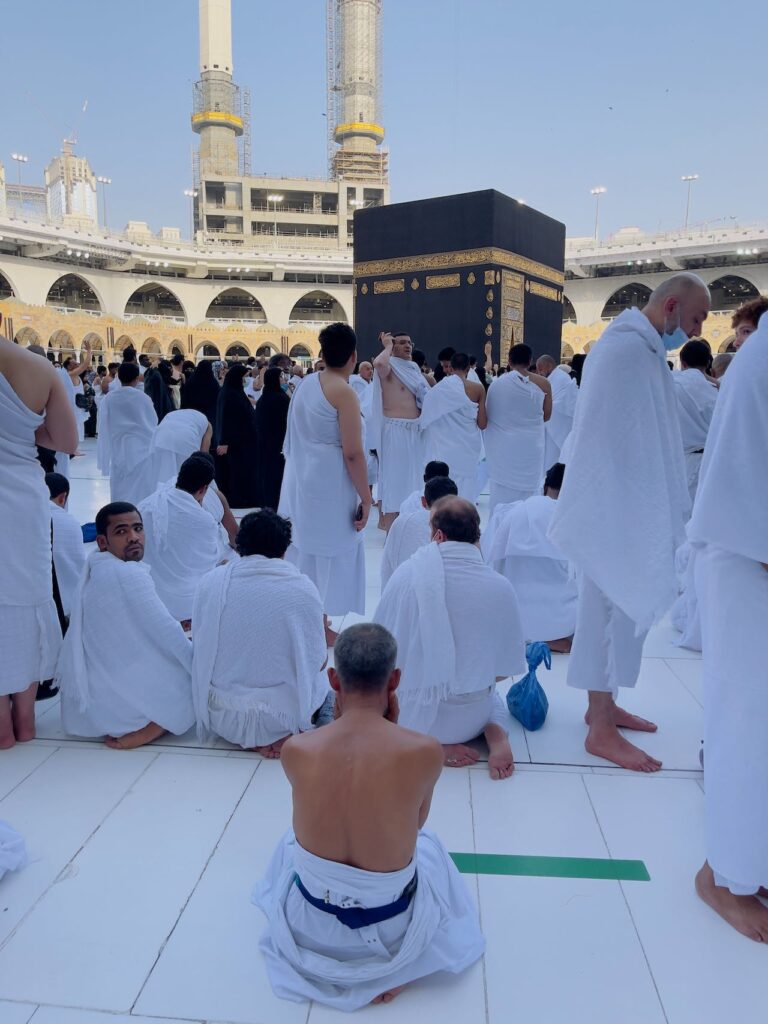The term “Ihram” is often associated with the physical state of pilgrimage in Islam, where believers enter a sacred state by donning specific garments and adhering to certain rituals. However, the concept of Ihram holds deeper meanings beyond its literal interpretation. In this article, we will explore the Other Meanings of Ihram, shedding light on its spiritual, psychological, and symbolic dimensions. By delving into these alternative perspectives, we aim to gain a more comprehensive understanding of Ihram and its significance in the lives of Muslims.
Other Meanings of Ihram
Firstly, According to the Merriam-Webster Dictionary
1- a state of consecration assumed by Muslims on pilgrimage to Mecca
2- the ceremonially plain clothing worn by Muslims on pilgrimage
Know More: Merriam-Webster
Secondly, Spiritually
While Ihram is commonly recognized as the attire and state of ritual purity required for Hajj and Umrah,
it is essential to recognize the spiritual journey it symbolizes. Ihram serves as a metaphorical representation of the pilgrim’s detachment from worldly desires and a wholehearted focus on seeking closeness to the Divine. By abandoning worldly attire and materialistic pursuits, pilgrims embody a state of humility and submission, reinforcing their commitment to spirituality. Ihram becomes a profound reminder to devotees that their ultimate purpose lies in the pursuit of spiritual growth and connection with Allah.
Psychological Transformation Through Ihram
Ihram encompasses a psychological aspect that extends beyond physical appearance. It serves as a transformative experience, allowing individuals to break free from their daily routines, responsibilities, and distractions. By adopting the state of Ihram, pilgrims consciously detach themselves from the mundane aspects of life, creating space for introspection and self-reflection. The pilgrim’s mental state undergoes a significant shift, fostering a sense of inner peace, clarity, and heightened consciousness. This psychological transformation within the Ihram state paves the way for a profound spiritual awakening and self-discovery.
Ihram is a Symbol of Equality and Unity
Beyond its individual significance, Ihram also carries a symbolic meaning of unity and equality within the Muslim community. Regardless of their social status, wealth, or background, all pilgrims dress in the same simple attire during Hajj and Umrah. This uniformity eliminates any visible differences, emphasizing the essential principle of Islamic brotherhood and sisterhood. Ihram serves as a powerful reminder that in the eyes of Allah, all believers are equal and united. This collective experience of wearing Ihram fosters a sense of belonging and solidarity among the pilgrims,
transcending geographic, cultural, and linguistic barriers.
Surrender and Submission to Allah
Ihram symbolizes the surrender and submission of the pilgrim to the will of Allah. By donning the simple white garments of Ihram, individuals consciously detach themselves from worldly pursuits and adornments. It serves as a reminder of the transient nature of material possessions and the importance of focusing on the spiritual realm. Ihram signifies the pilgrim’s readiness to submit to the commands of Allah, seeking His pleasure and guidance throughout their pilgrimage journey. It cultivates a sense of humility, reliance on God, and a deepened connection with the Divine.
Ritual Purity and Spiritual Cleansing
Entering the state of Ihram requires performing specific ablutions and cleansing rituals, signifying a state of ritual purity. This purification process extends beyond the physical realm and aims to purify the heart and soul. Ihram serves as a spiritual reset, cleansing pilgrims of their past sins and facilitating a fresh start on their journey of faith.
Conclusion
In conclusion, Ihram, commonly associated with the physical state of pilgrimage, encompasses deeper meanings that extend beyond the mere donning of sacred attire. Through exploring the spiritual, psychological, and symbolic dimensions of Ihram, we unravel its profound significance in the lives of Muslims. Ihram represents a spiritual journey, symbolizes psychological transformation, and fosters unity and equality among believers. By embracing these alternative meanings of Ihram, we can deepen our understanding of its purpose and apply its lessons of humility, detachment, and unity to our lives beyond the pilgrim’s journey.






